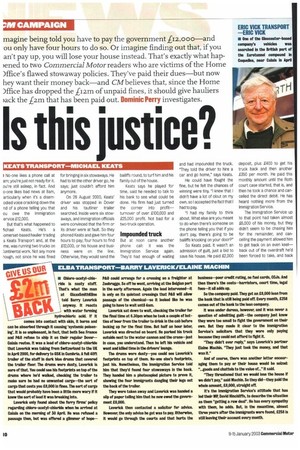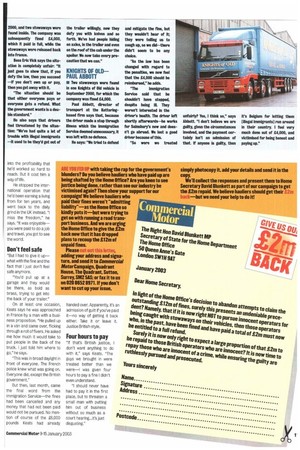Is this justice?
Page 10

Page 11

If you've noticed an error in this article please click here to report it so we can fix it.
KEATS TRANSPORT—MICHAEL KEATS
I No-one hkes a phone call at am; you're just not ready for it. ou're still asleep, in fact. And o-one likes bad news at Bam, articularly when it's a disemodied voice crackling down the nd of a phone telling you that ou owe the Immigration ervice £12,000.
But that's what happened to fichael Keats. He's a .omerset-based haulier trading s Keats Transport and, at the me, was running two trucks on :ontinental work. Not any more hough, not since he was fined for bringing in six stowaways. He had to let the other driver go, he says; just couldn't afford him anymore.
On 28 August 2000, Keats' driver was stopped in Dover and his tautliner trailer searched. Inside were six stowaways, and immigration officials were convinced that the firm or its driver were at fault. So they phoned Keats and gave him four hours to pay; four hours to find £12,000, or his house and business were on the line. Otherwise, they would send the bailiffs round, to turf him and his family out of the house.
Keats says he played for time, said he needed to talk to his bank to see what could be done. His firm had just turned the corner into profit— turnover of over £100,000 and 225,000 profit. Not bad for a two-truck operation.
Impounded truck
But at noon came another phone call: it was the Immigration Service again. They'd had enough of waiting and had impounded the truck. They told the driver to hire a car and go home," says Keats.
He could have fought the fine, but he felt the chances of winning were tiny. "I knew that I didn't have a lot of clout on my own, so I accepted the fact that I had to pay.
"I had my family to think about. What else are you meant to do when there's someone on the phone telling you that if you don't pay, there's going to be bailiffs knocking on your door?"
So Keats paid. It wasn't an admission of guilt, just a bid to save his house. He paid £2,000 deposit, plus 2400 to get his truck back and then another £350 per month. He paid this monthly amount until the Roth court case started, that is, and then he took a chance and cancelled the direct debit. He has heard nothing more from the Immigration Service.
The Immigration Service up to that point had taken almost 26,000 of his money, but they didn't seem to be chasing him for the remainder, and cancelling the payment allowed him to get back on an even keel— back out of the overdraft he'd been forced to take, and back into the profitability that he'd worked so hard to reach. But it cost him a way of life.
He stopped the international operation that he'd been earning a living from for ten years, and went back to the daily grind in the UK instead. "I miss the freedom, he says. "It was enjoyable— you were paid to do a job and travel, you got to see the world.
Don't feel safe
"But I had to give it up— what with the fine and the fact that I just don't feel safe anymore.
"You'd pull up at a garage and they would be there, as bold as brass, trying to get into the hack of your trailer."
On at least one occasion, Keats says he was approached in France by a man with a business proposition. He pulled up in a van and came over, flicking through a roll of fivers. He asked me how much it would take to put people in the back of the truck. I just told him where to go," he says.
'This was in broad daylight in front of everyone. The French police knew what was going on. Everyone did, except the British government," But then, last month, came the final word from the Immigration Service—the fines had been cancelled and any money that had not been paid would not be pursued. No mention of course of the £6,000 pounds Keats had already handed over. Apparently, it's an admission of guilt if you've paid it—no way of getting it back either. Take it or leave it. Justice British-style.
Four hours to pay
"If that's British justice, I don't want anything to do with it," says Keats. "The guys we brought in were treated better than we were—I was given four hours to pay a fine I didn't even understand.
"I should never have had to pay it in the first place, but to threaten a small man with putting him out of business without so much as a court hearing...it's just disgusting."
























































































































































